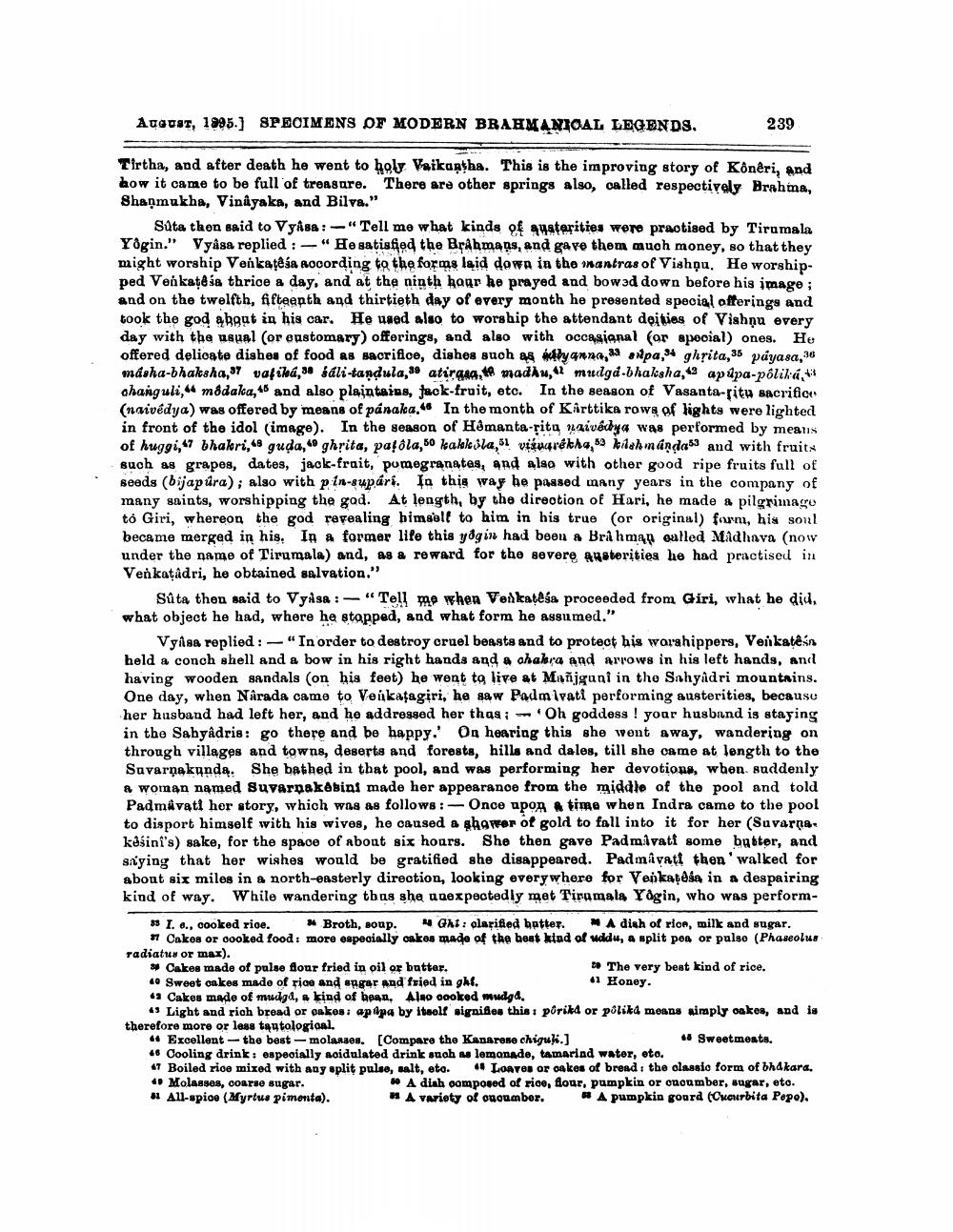________________
AUGUST, 1995.] SPECIMENS OF MODERN BRAHMANIOAL LEGENDS.
239
Tirtha, and after death he went to holy Vaikamsha. This is the improving story of Kônêri, and how it came to be full of treasure. There are other springs also, called respectively Brahma, Shanmukha, Vinayaka, and Bilva."
Sata thon said to Vyasa : -"Tell me what kinds of waterities were practised by Tirumala Yogin." Vyasa replied : -" He satisfied the Brahmans, and gave them much money, so that they might worship Venkatesa according to the forms laid down in the mantras of Vishou. He worshipped Venkatesa thrice a day, and at the ninth haqr he prayed and bowed down before his image ; and on the twelfth, fifteenth and thirtieth day of every month he presented special offerings and took the god about in his car. He used also to worship the attendant deities of Vishnu every day with the usual (or eustomary) offerings, and also with occasional for special) ones. He offered delicate dishes of food as sacrifice, dishes such as blyanna, spa,** ghrita,35 payasa, 36 mdsha-bhaksha, 57 vafilo, se sali-tandula, ao atirada, madhu, mudgd-bhaksha, apúpa-pôliká, 43 changuli, modaka, 45 and also plaintains, fack-fruit, etc. In the season of Vasanta-ritu sacrifice (naivedya) was offered by means of pánaka. In the month of Karttika rows of lights were lighted in front of the idol (image). In the season of Hômanta-rito nzivédya was performed by means of huggi, 47 bhakori, quda, ghrita, palla, 50 kakk la,l viávarékha, 59 kish manda53 and with fruit such as grapes, dates, jack-frait, pomegranates, and also with other good ripe fruits full of seeds (bijapura); also with pin-supári. In this way he passed many years in the company of many saints, worshipping the god. At length, by the direotion of Hari, he made & pilgrimaco to Giri, whereon the god revealing himself to him in his true (or original) form, his soul became merged in his. In a formar lite this yögin had boou a Brahman outled Madhava (now under the name of Tirumala) and, as a reward for the severe austerities he had practised in Venkatadri, he obtained salvation."
Sû ta then said to Vyasa : - "Tell me when Venkatesa proceeded from Giri, what he did, what object he had, where he stapped, and what form he assumed."
Vyasa replied: - "In order to destroy cruel beasts and to protect his worshippers, Venkatesa held a conch shell and a bow in his right hands and a chakra and arrows in his left hands, and having wooden sandals (on his feet) he went to live at Mañjgani in the Sahyadri mountains. One day, when Närada came to Veikatagiri, he saw Padmivati performing austerities, because her husband had left her, and he addressed her thas: - Oh goddess ! yoаr husband is staying in the Sahyadris: go there and be happy. Og hearing this she went away, wandering on through villages and towns, deserts and forests, hills and dales, till she came at length to the Savarņakundą. She bathed in that pool, and was performing her devotions, when suddenly & woman named Suvarnakebini made her appearance from the middle of the pool and told Padmavati hor story, which was as follows:- Once upon a time when Indra came to the pool to disport himself with his wives, he caused a shower of gold to fall into it for her (Suvarna. kasini's) sake, for the space of about six hours. She then gave Padmivati some butter, and saying that her wishes would be gratified she disappeared. Padmavati then 'walked for about six miles in a north-easterly direction, looking everywhere for Venkatesa in a despairing kind of way. While wandering tbas she unexpectedly met Tirumala Yågin, who was perform
3 1. e., cooked rioe. * Broth, soup. Ghi: clarified batter. A dish of rion, milk and sugar.
57 Cakes or cooked food : more especially cakes made of the beat kind of uddu, a split pea or pulse (Phaseolus radiatus or max). » Cakes made of pulse flour fried in oil or batter.
* The very best kind of rice. 49 Sweet onkes made of rice and sugar and fried in ghi.
41 Honey • Cakes made of mudgl, a kind of bpan. Also oooked wudga.
43 Light and rich broad or oakes: ap apa by itself signifies this : pôrikd or polikt monds simply cakes, and is therefore more or less tautological + Excellent - the best-molandes. Compare the Kanarose chiguk.)
48 Sweetmeats. 46 Cooling drink: especially acidulated drink such as lemonade, tamarind water, eto. 47 Boiled rice mixed with any split pulso, salt, eto. "LOAves or onkos of brend: the classic form of bhakara. 4. Molasses, coarse sugar.
A dish composed of rice, flour, pumpkin or cucumber, sugar, eto. # All-spice (Myrtus pimenta). NA variety of ououmbor. A pumpkin gourd (Cucurbita Popo),




